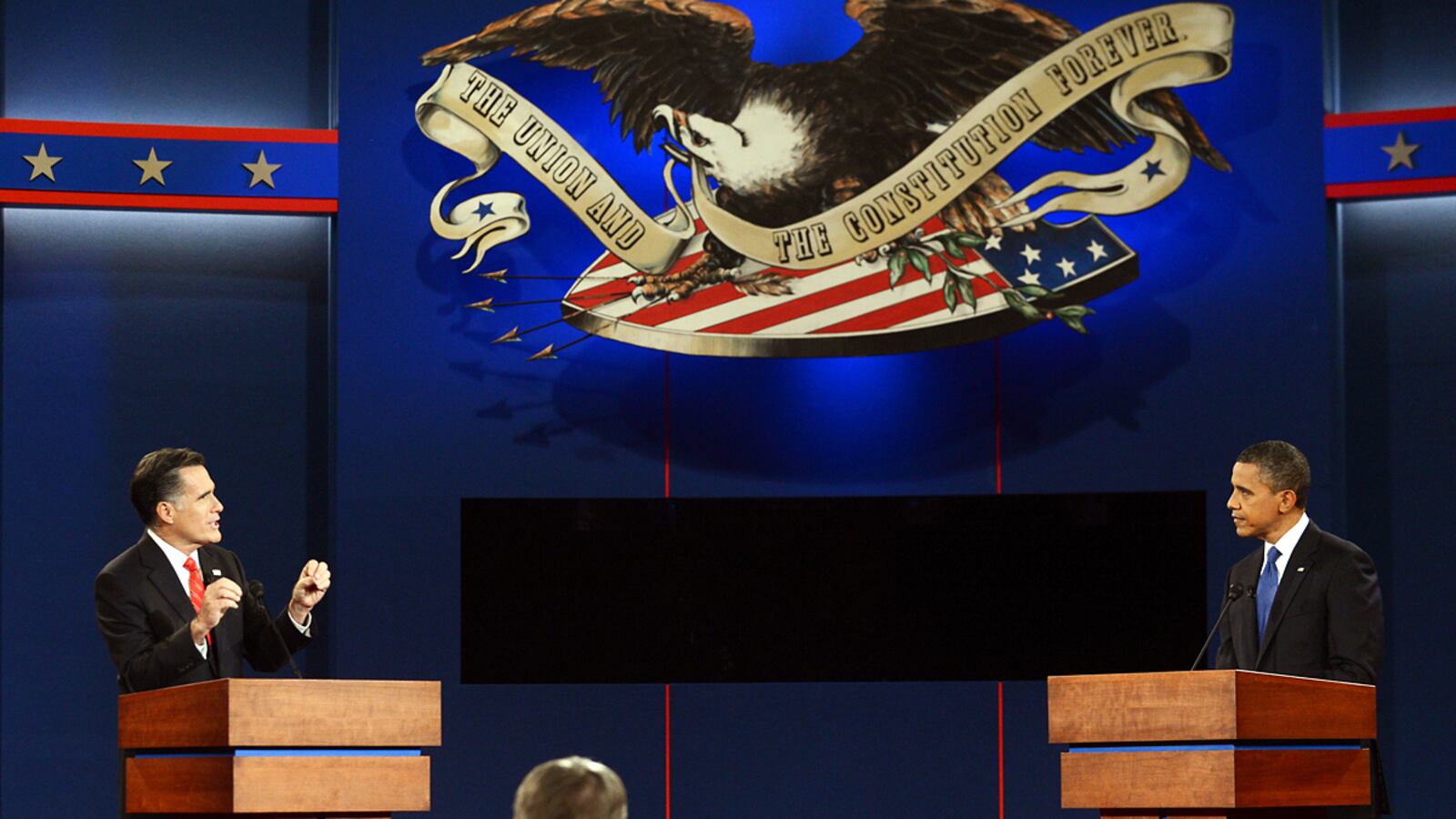This was supposed to be a debate about the economy–— the gripping, all-consuming question. How is the creaky engine of global growth performing? How can it boost demand and soak up all the unemployed and underemployed? What should be done about the crisis of unemployment? About housing? How can America compete in global markets? And how does the state of play in the global markets affect the economic experience of individuals?

That’s not what happened. What we saw was a discussion that was very narrowly contained—the type I’ve seen a dozen times at Davos, at Washington think tanks, on Metro North. Entitlement reform, discussed in abstract terms. Reducing the deficit, as a presumed end rather than a means. The Simpson-Bowles Commission, for G-d’s sake. A long back and forth about Dodd-Frank? I can barely muster up the energy to follow the discussion about Dodd-Frank, and I get paid to do this. There was no discussion of the bailouts and revival of the nation’s largest manufacturing and retail sector: the automobile industry. There was precious little mention of the unemployed. And if they talked about housing, I must have slept through it.
At the outset, the candidates set up opposite approaches—Obama calling for “economic patriotism” and Romney complaining about “trickle-down government.” But the differences weren’t sustained. Obama didn’t hit Romney on his Bain experience, or on his atrocious 47 percent remarks. Romney’s mentions of overreaching government were rote.
That said, especially in the early going, Romney had the better of it. Stylistically, he was on the front foot—aggressive, prepared, and engaged. Romney gets truly animated when he talks about enterprise, business creation, and—above all—bringing down tax rates. Obama simply isn’t as fluent—never has been—when talking about the economy, and the connection between government policy and economic growth.
There was a great deal missing from the parts of the debate that were supposed to be on the economy—passion, aggression, and a game plan by Obama, truthfulness by Romney. Romney continually said that his massive reductions in marginal rates wouldn’t be tax cuts, because ... well, just because he said so. That’s a new one on me.
But more significantly, while both candidates occasionally dipped into the real world—isn’t it funny how so many of their meaningful encounters with struggling voters happened to take place in Ohio—the entire discussion was remarkably detached from the reality of today’s economy. There have been some significant changes in the U.S. economy in the past three years—good and bad. A massive increase in exports and rise in trade. A sharp rise in domestic energy production, which in turn stimulates other industries. An incredible rebound in the credit and stock markets, and in corporate profits. At the same time, we have a historically stubborn unemployment problem, a decline in median income, and a massive increase in income inequality.
These developments present—and demand—responses from politicians and government. And we’ve certainly got some reactions and counter-reactions in the past four years. But in Denver Wednesday night, the two candidates were oddly detached from the realities of the U.S. economy circa 2012. Obama failed to make his case for the positive trends in recent years, and Romney failed to connect the dots on how his policies would be implemented, and how they would bring help to people struggling today. In fact, at the outset, when the candidates laid out their economic plans, they were somewhat interchangeable: trade, energy, education/skills, blah, blah, blah.
Yes, they highlighted some differences about the path forward. Romney doesn’t want higher revenues to play a role in deficit reduction; Obama is happy for the rich to pay higher taxes. Obama wants to keep Medicare and Obamacare as they are. Romney wants to keep Medicare as it is—for current beneficiaries—and replace Obamacare with ... well, it’s not quite clear. And so on.
I’m not particularly concerned with who won the debate, although if I were forced to declare a winner, I’d say Romney did. What I am concerned with was the poor quality of the debate. There was plenty of talk about the working poor and the unemployed, but they were used mostly as props. The crucial issue for the next four years is how to make economic growth work for everyone, how to get people back to work, and how to find and deploy the resources necessary to make our systems function well. I heard a lot more discussion of Dodd-Frank and Simpson-Bowles on Wednesday night than I did on those topics.





